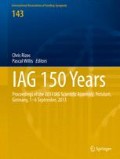Abstract
Integer ambiguity estimation and validation are crucial steps when solving the carrier-phase based GNSS model. For the validation, different ambiguity acceptance tests have been proposed. For those tests often fixed critical values are used, with the important disadvantage that the performance of the tests varies a lot depending on measurement set-up and circumstances. Therefore it is better to use model-driven critical values such that it is guaranteed that the failure rate will not exceed a user-defined threshold. This contribution will study the model-dependency of the critical values for two well-known acceptance tests, the ratio test and difference test, and then specifically for a given application. This means that mainly the satellite-receiver geometry and number of epochs will be variable. It will be shown that critical values do exhibit a strong dependence on these factors, and it will not be possible to simply use a fixed (i.e., constant) application-driven critical value.
Access this chapter
Tax calculation will be finalised at checkout
Purchases are for personal use only
References
Abidin HA (1993) Computational and geometrical aspects of on-the-fly ambiguity resolution. Ph.D. Thesis, Department of Surveying Engineering, Technical Report no.104, University of New Brunswick, 314 pp.
Chen Y (1997) An approach to validate the resolved ambiguities in GPS rapid positioning. In: Proceedings of the international symposium on kinematic systems in geodesy, geomatics and navigation, Banff
Euler HJ, Schaffrin B (1991) On a measure for the discernibility between different ambiguity solutions in the static-kinematic GPS-mode. In: IAG symposia no. 107, kinematic systems in geodesy, surveying, and remote sensing. Springer, New York, pp 285–295
Frei E, Beutler G (1990) Rapid static positioning based on the fast ambiguity resolution approach FARA: theory and first results. Manuscr Geod 15:325–356
Han S (1997) Quality control issues relating to instantaneous ambiguity resolution for real-time GPS kinematic positioning. J Geod 71:351–361
Han S, Rizos C (1996) Validation and rejection criteria for integer least-squares estimation. Surv Rev 33(260):375–382
Landau H, Euler HJ (1992) On-the-fly ambiguity resolution for precise differential positioning. In: Proceedings of ION GPS 1992, The Institute of Navigation, Fairfax, pp 607–613
Odijk D, Verhagen S, Teunissen PJG (2012) Medium-Distance GPS Ambiguity Resolution with Controlled Failure Rate. In: Kenyon S et al (eds) Geodesy for planet earth. International association of geodesy symposia, vol 136. Springer, Berlin, pp 745–751
Teunissen PJG (1995) The least-squares ambiguity decorrelation adjustment: a method for fast GPS integer ambiguity estimation. J Geod 70:65–82
Teunissen PJG (1999) An optimality property of the integer least-squares estimator. J Geod 73:587–593
Teunissen PJG (2003) Integer aperture GNSS ambiguity resolution. Artif Satell 38:79–88
Teunissen PJG (2005) GNSS ambiguity resolution with optimally controlled failure-rate. Artif Satell 40:219–227
Tiberius CCJM, De Jonge PJ (1995) Fast positioning using the LAMBDA method. In: Proceedings of DSNS’95, Bergen, paper no. 30
Verhagen S (2005) The GNSS integer ambiguities: estimation and validation. PhD thesis, Delft University of Technology, Netherlands Geodetic Commission, No. 58
Verhagen S, Teunissen PJG (2006) New global navigation satellite system ambiguity resolution method compared to existing approaches. J Guid Control Dyn 29:981–991
Verhagen S, Li B (2012) LAMBDA Software Package - Matlab implementation, version 3.0. Delft University of Technology and Curtin University, 39p
Verhagen S, Teunissen PJG (2013) The ratio test for future GNSS ambiguity resolution. GPS Solutions 17:535–548
Verhagen S, Li B, Teunissen PJG (2013) Ps-LAMBDA: Ambiguity success rate evaluation software for interferometric applications. Comput Geosci 54:361–376
Wang J, Stewart MP, Tsakiri M (1998) A discrimination test procedure for ambiguity resolution on-the-fly. J Geod 72:644–653
Wu Y, Jin SG, Wang Z, Liu J (2010) Cycle slip detection using multi-frequency GPS carrier phase observations: a simulation study. Adv Space Res 46(2):144–149
Acknowledgements
This work has been executed in the framework of the Positioning Program Project 1.01 “New carrier phase processing strategies for achieving precise and reliable multi-satellite, multi-frequency GNSS/RNSS positioning in Australia” of the Cooperative Research Centre for Spatial Information.
Author information
Authors and Affiliations
Corresponding author
Editor information
Editors and Affiliations
Rights and permissions
Copyright information
© 2015 Springer International Publishing Switzerland
About this paper
Cite this paper
Verhagen, S., Teunissen, P.J.G., Zhang, J. (2015). Application-Driven Critical Values for GNSS Ambiguity Acceptance Testing. In: Rizos, C., Willis, P. (eds) IAG 150 Years. International Association of Geodesy Symposia, vol 143. Springer, Cham. https://doi.org/10.1007/1345_2015_36
Download citation
DOI: https://doi.org/10.1007/1345_2015_36
Published:
Publisher Name: Springer, Cham
Print ISBN: 978-3-319-24603-1
Online ISBN: 978-3-319-30895-1
eBook Packages: Earth and Environmental ScienceEarth and Environmental Science (R0)

